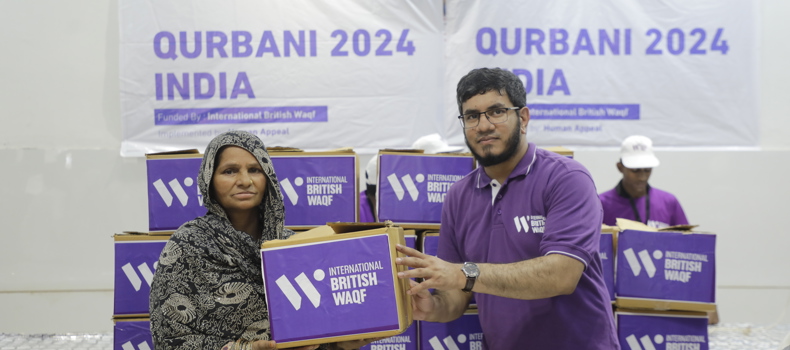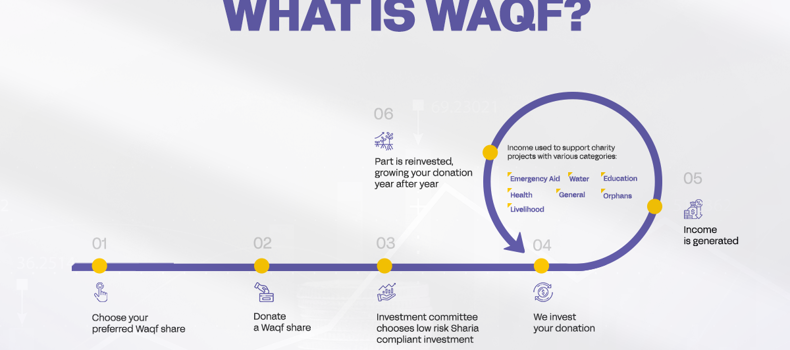Big changes ahead. Stay tuned!
Big changes ahead. Stay tuned!
Nothing here
Start typing to search
Searching..
Nothing matches
There are no matching results.
Sorry!
There has been an error.
Big changes ahead. Stay tuned!
Big changes ahead. Stay tuned!
Nothing here
Start typing to search
Searching..
Nothing matches
There are no matching results.
Sorry!
There has been an error.

How to Make a Charitable Waqf
Charitable waqf is one of the most effective forms of sustainable giving in Islam. When an individual establishes a waqf, they donate something they cherish—whether it be property, assets, or funds—intending to serve the Muslim community in various capacities, for as long as Allah wills. This is why waqf is regarded as one of the most significant forms of sadaqah jariyah (ongoing charity), whose impact can endure for decades.
How to Establish a Charitable Waqf
A charitable waqf operates by dedicating a permanent asset, such as real estate or financial investments, to a specific beneficiary organisation. The capital asset is then invested, and the income generated is utilised to fund a variety of charitable projects.
At The International British Waqf, we adhere to this fundamental principle. We invest waqf donations in low-risk ventures, such as real estate, and subsequently use the returns to support sustainable projects, including providing clean drinking water, promoting education, and offering relief to those in need. Furthermore, we reinvest a portion of the returns to ensure that the initial donation remains intact, grows over time, and continues to finance additional projects.
This means that by donating to a charitable waqf with The International British Waqf, you can guarantee that your generosity reaches those in need for numerous years to come.
Steps to Create a Charitable Waqf
If you are considering establishing a charitable waqf, you can follow these steps:
With The International British Waqf, you can participate in established waqf projects without the complexity of creating your own, making the process simpler and more secure.

Best Charitable Waqf Options
Every asset you dedicate to serve your community is deemed a good waqf, with Allah’s blessing. However, the most effective types of charitable waqf address the urgent needs of the communities they serve. Here are some options:
These waqf projects and more are available to consider when you donate through The International British Waqf.
What Are the Conditions of Charitable Waqf?
Islamic law outlines several straightforward conditions for a donation to qualify as a charitable waqf. It is essential to understand that a one-time donation, although commendable, differs significantly from the concept of an ongoing waqf.
To create a charitable waqf, the following conditions must be met:
For instance, consider a scenario where you dedicate your car to a care home, allowing it to be used for transporting residents and fulfilling their needs free of charge. In this case, the asset is the car, and you are not permitted to sell or claim rent for it. The care home is the beneficiary, responsible for its management.
Another example related to our operations is the dedication of a sum of money as a waqf share for water supply projects. We manage these funds and utilise the returns to finance such projects, while you relinquish any claim to that money thereafter.
The Role of Charitable Waqf in Society
Charitable waqf has a profound and lasting impact on societal support, contributing to:
By supporting waqf projects through The International British Waqf, you have the opportunity to improve the lives of thousands and ensure the sustainability of your generosity.

The Importance of Charitable Waqf During Ramadan
So, why choose waqf? The holy month of Ramadan presents a remarkable opportunity to amplify the rewards of righteous deeds, particularly through ongoing charity. Since waqf functions similarly to sadaqah jariyah (ongoing charity), and good deeds are exponentially rewarded during this blessed month, a donation designated as a waqf share becomes an incredibly rewarding investment in the eyes of Allah.
During Ramadan, charitable waqf provides iftar meals for those fasting each year, supports water supply initiatives, and contributes to meeting the needs of orphans. By donating through The International British Waqf during the blessed days of Ramadan—especially in the last ten nights—you can transform your generosity into enduring sadaqah jariyah, benefiting those in need long after you have passed.
In Conclusion
In our modern era, waqf has adopted various accessible forms, thanks to the increased availability of resources for both needy communities and the organisations managing waqfs. Monitoring your waqf has also become simpler due to regular updates provided by these organisations.
At The International British Waqf, our aim in revitalising the tradition of waqf in this manner is to engage individuals in the ongoing cycle of sustainable giving and development, all while earning the rewards associated with sadaqah jariyah.
Frequently Asked Questions
What is a charitable waqf?
A charitable waqf pertains to the holding of an asset—be it financial or real estate—and dedicating its returns to support charitable projects and public benefits, such as education and health.
What is the difference between charitable waqf and Waqf Ahli (Family Waqf)?
Charitable waqf is designated for public benefit, serving the community at large, while family waqf (also known as Waqf ahli) is directed towards supporting the descendants of the endower. The familial waqf may convert to charitable waqf if those beneficiaries are no longer in need.
What are the primary characteristics of charitable waqf?
Charitable waqf is characterised by its permanence, the investment of its returns into charitable activities, and the inalienability of the principal asset.
Is it permissible to sell a charitable waqf?
Generally, selling a charitable waqf is prohibited, except in exceptional cases where replacement is necessary to serve a greater purpose, with the approval of the relevant authorities.
Why should I donate to waqf through The International British Waqf?
You can trust us to provide a safe investment that adheres to Islamic law for your waqf. Moreover, we ensure global reach to the most in-need communities through our collaboration with our parent organisation, Human Appeal.